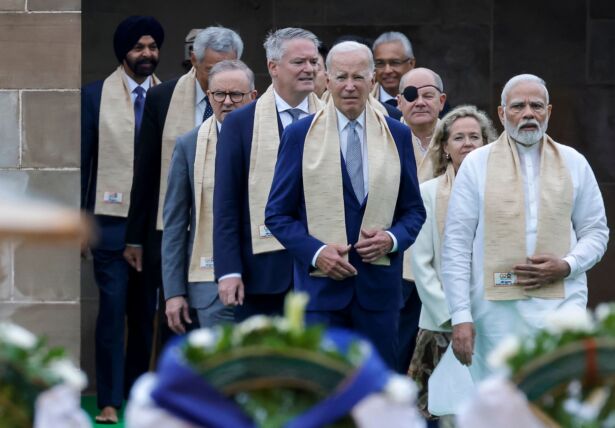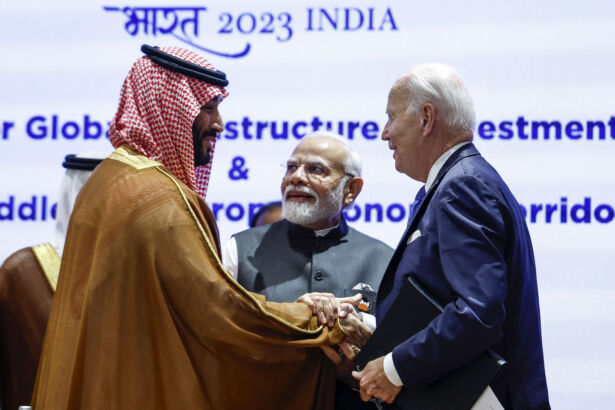HANOI, Vietnam—President Joe Biden concluded his meetings on Sunday at the Group of 20 (G20) summit, which was held in India’s capital New Delhi, after paying tribute to the father of the nation, Mahatma Gandhi, alongside other world leaders. The president left India to travel to Vietnam, where he will announce a strengthened partnership with the communist nation on Sunday.
The president traveled to Asia at a time when competition between the United States and China was intensifying. This year’s summit revealed heightened tensions between two powerful countries, as evidenced by Chinese leader Xi Jinping’s absence from the summit and Beijing’s objections to the United States hosting the G20 Summit in 2026.
Some argue that Mr. Xi’s absence means that it is abandoning the G20 and establishing an alternative world order. To counter that notion, President Biden sought to fill the void left by Mr. Xi at this year’s summit by presenting America as a more reliable partner than China and capable of uniting the world’s richest countries around common goals, including providing “non-coercive” development financing options to developing countries.
“It would be nice to have him here,” President Biden told reporters in India when asked about whether Mr. Xi’s absence impacted the summit.
“But, no,” he added. “The summit is going well.”

At the New Delhi summit, the G20 members were divided over many issues, including the war in Ukraine; however, leaders made several key decisions during the two-day summit in India’s capital.
Key Takeaways From the Two-Day Summit
Joint Statement From the Fragmented Group
The most contentious issue at this year’s summit was how to address the Ukraine war in the joint communiqué. There was skepticism that a summit communiqué would be issued due to significant divisions amongst members.
While some countries demanded strong language against Russia, labeling the G20 member as an aggressor, India, the G20 president, had been trying to strike a balance in the summit declaration. India’s close relationship with Moscow and its unwillingness to issue strong statements complicated the effort as well.
The G20 members finally agreed on Sept. 9 to adopt a consensus declaration that avoided specifically denouncing Russia over the war in Ukraine, instead broadly urging all countries to refrain from using force to annex territory.
“In line with the U.N. Charter, all states must refrain from the threat or use of force to seek territorial acquisition against the territorial integrity and sovereignty or political independence of any state. The use or threat of use of nuclear weapons is inadmissible,” the declaration read.
Despite Russia and China’s objections, the leaders also reached a compromise on the language in several paragraphs to describe the war in Ukraine.
“We highlighted the human suffering and negative added impacts of the war in Ukraine with regard to global food and energy security, supply chains, macro-financial stability, inflation, and growth, which has complicated the policy environment for countries,” the communiqué stated. “There were different views and assessments of the situation.”
The statement from the Bali meeting said that “most members strongly condemned the war in Ukraine,” which was not included in this year’s statement. The Bali statement had also quoted a U.N. resolution deploring “in the strongest terms the aggression by the Russian Federation against Ukraine and demands its complete and unconditional withdrawal from the territory of Ukraine.”
Hence, this year’s statement is viewed as having softer language regarding the Russia-Ukraine war than last year’s declaration.
The Ukrainian foreign ministry called the joint declaration “nothing to be proud of,” as it failed to label Russia as an aggressor in the war.
The White House defended the statement, calling it “unprecedented.”
“The vast majority of G20 countries have supported multiple U.N. resolutions that call out Russia’s illegal aggression,” deputy national security adviser Jon Finer told reporters on Sunday.
“The joint statement issued yesterday builds on that to send an unprecedented, unified statement on the imperative that Russia refrain from using force for territorial acquisition,” he added.
Railway Project to Counter Belt and Road
At the summit, the United States, India, Saudi Arabia, and the United Arab Emirates announced a memorandum of understanding (MOU) (pdf) for an infrastructure project that will connect India, the Middle East, and Europe via sea and rail transportation.
The project will create an economic corridor linked by a railway line and existing ports through the UAE, Saudi Arabia, Jordan, and Israel. However, this is not a done deal. The United States will play a critical role in facilitating the negotiations over the terms of the agreement for this infrastructure project, White House officials said.

“This is a big deal. This is a real big deal,” President Biden said, welcoming the MOU in a speech during the summit.
The project is considered one of the White House’s key initiatives in the Middle East to counter China’s growing influence in the region through its controversial infrastructure program, the Belt and Road Initiative (BRI).
Since its launch in 2013, China’s BRI has poured billions of dollars into infrastructure projects across Africa, Latin America, Eastern Europe, and Asia. In recent years, however, Beijing has been accused by the United States of using “debt-trap diplomacy” to lure many nations into its orbit.
This MOU is part of the Partnership for Global Infrastructure and Investment (PGII) initiative led by the Group of Seven (G7) countries to fund infrastructure projects in developing countries.
PGII projects focus on “high-quality investments in building sustainable infrastructure around the world,” according to the White House.
Due to its scope and ambitions, the railway project is “groundbreaking,” Mr. Finer told reporters during a briefing on Saturday.
“We see this as having a high appeal to the countries involved and also globally because it is transparent, because it is a high standard, because it is not coercive,” he added.
To avoid angering the regime in Beijing, however, Mr. Finer stated that this initiative is not to counter China’s growing influence in the Middle East.
“We do not see it as zero sum with other approaches to infrastructure,” he said. “We are not asking countries to make this zero-sum choice, but we do think the value proposition that we have to offer is high.”
US to Host G20 Despite Beijing’s Opposition
According to several media reports, China expressed opposition to the United States hosting the G20 in 2026 as the Biden administration had announced.
China’s objection, which was supported by Russia, was largely symbolic and reflected Beijing’s dispute with the United States, according to the reports, citing sources familiar with talks.
National security advisor Jake Sullivan did not deny the reports while speaking to reporters in New Delhi on Saturday, but he noted that the communique had already adopted the decision.
“All I can say is the communique is done,” he said. “The reference to the United States as the host in 2026 is part of it. China has agreed that; all of the G20 members have agreed that; and we’re gratified by that.”
Premier Li Qiang represented China at this year’s summit in place of Mr. Xi.
Russian President Vladimir Putin also skipped this year’s summit. Mr. Putin’s absence was anticipated as he did not attend the summit last year. Russia was represented by foreign minister Sergey Lavrov.
Mr. Finer said, as far as he knew, the president spoke with neither of them during the summit.
From The Epoch Times

